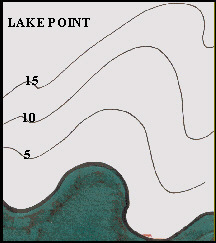The
Brisbane River is the original waterway beneath Lake Wivenhoe.
As the river wound its way through the land it carved out a course
thatcreated this valley. A conbination of erosion and deposition
of soil have created long linger spurs and points that run from
higher elevations into the river channel. When the lake was flooded
many of the spurs of land were inundated with water. Some points
produce better and more regular catches of fish than others. The
characteristics of good points are scrutinised below.
Northerly aspect, water conditions in these areas are often
optimal. The sun provides warmth and light to the water for longer
periods during the day. In turn weed growth proliferates and creates
the basis of one of the many food chains in a lake. Aquatic weed,
crustaceans and small bait fish are an integral part to the foodchain,
with bass and other predator fish at the top. Weed beds also offer
cover and shelter to all its small and large inhabitants, and
these areas often contain both active bass (hunting for forage)
and inactive (bass sheltering in the weed).
Deep water not too far away, if water depth rapidly drops
away from a typical spur, optimal water conditions are provided
over a large area that joins both shallow water weedlines and
the deeper waters of a channel of drop off. Bass move up from
deep water security and relative comfort zone to hunt and partol
in the shallow feeding areas. Bass will often prefer to remain
stationary in the deep water in an inactive state. Often under
low light conditions, bass will then move up to the shallow water
areas where they actively begin to hunt prey. In summer this may
be a daily routine where as in winter it may be more irregular.
A spur or saddle between two deep channels, this is where
you can theoretically double your luck when fishing. A submerged
ridge divides two deeper channels and bass congregate in these
areas when the water conditions are best. Bass may remian stationary
around the outer edge of the spur in deeper water until conditions
change or they get hungry. Bays are often formed between spurs
and points and these too can be productive under certain conditions.
When Lake Wivenhoe was low, water levels of 3/4 capacity, submerged
mian lake points offered some of the most productive deep water
trolling available in Lake Wivenhoe. Many bass 50 cm + have been
encountered in the areas out from Hamon Cove. Trolling these points
is a productive method to locate actively feeding bass. Extra
deep diving lures are a must, keep searching likely water in a
methodical pattern to cover as much of this type of country as
possible. Deep underwater points offer reguge to schools of baitfish
as well as where there is forgage bass won't be too far away.





